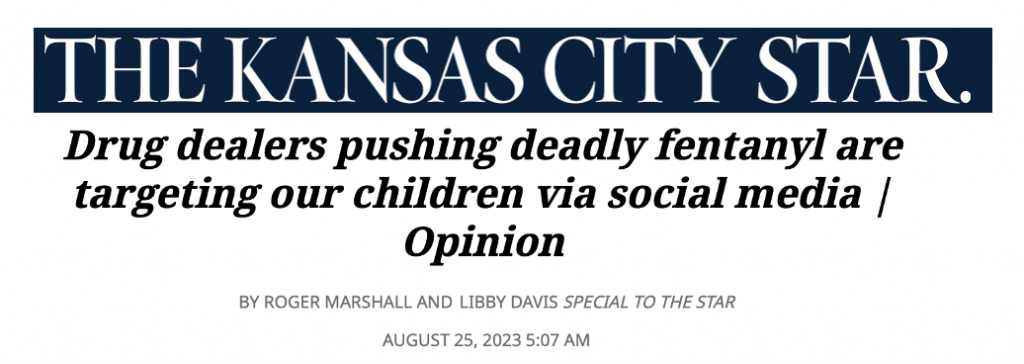- August 25, 2023
ICYMI: Senator Marshall, Libby Davis Op-Ed in Kansas City Star: Drug Dealers Pushing Deadly Fentanyl Are Targeting Our Children Via Social Media
Kansas City, KS – U.S. Senator Roger Marshall, M.D. and Libby Davis co-authored an op-ed in the Kansas City Star as part of this week’s statewide #OnePillCanKill Fentanyl Awareness Campaign. The op-ed focuses on the story of Libby’s son Cooper, who tragically lost his life in 2021 from fentanyl poisoning, as well as legislation Senator Marshall and Libby are working on that aims to crackdown on drug dealers targeting young users on social media platforms.
Throughout this week, Senator Marshall’s #OnePillCanKill Fentanyl Awareness Campaign has been focused on raising awareness about the dangers of illicit fentanyl and its presence in communities across Kansas. The coalition includes the Kansas federal delegation, law enforcement, educators, members of the state legislature, and health care groups and more totaling over 100 Kansas organizations participating.
More information about Senator Marshall’s Fentanyl Awareness Campaign, along with live updates can be found atMarshall.Senate.Gov/fentanyl-awareness.

You may click HERE or on the image above to read the full op-ed.
Highlights from Senator Marshall and Libby Davis’ op-ed include:
On Cooper Davis, a Young Kansas Teen Who Lost His Life to Fentanyl:
“At just 16 years old, Mill Valley High School junior Cooper Davis had his entire life ahead of him. Cooper had a smile that could light up any room and an infectious, fun-spirited personality to match. Like most 16-year-old boys, Cooper loved adventure, extreme sports, skateboarding, mountain biking, rock climbing, snowboarding and wakeboarding. If there was an adventure to be had, Cooper was ready to accept the challenge.”
“But in a blink of an eye, Cooper’s journey was tragically cut short when he and his friends took what they thought was Percocet. The pills, acquired through social media, were counterfeit and made with lethal fentanyl, a powerful synthetic opioid painkiller that has morphed into an illicit and deadly poison. Fentanyl is the deadliest drug our nation has ever seen. It’s 50 times stronger than heroin and 100 times more potent than morphine. Fentanyl is often referred to as a silent killer since it cannot be detected by taste, smell or sight when mixed with other drugs. That August night, three of the four teenagers survived. Cooper took half of a pill and died of fentanyl poisoning.”
“Cooper’s story is a heartbreaking reminder of the devastating realities of the fentanyl crisis and the urgent need for action and awareness to this nationwide epidemic.”
On the Fentanyl Epidemic in Kansas:
“Getting a counterfeit pill delivered to your door has become easier and cheaper for our kids than ordering a pizza. Cooper’s story, sadly, is not an isolated incident. With teenagers growing reliant on social media, a dangerous and deadly new drug threat has emerged: Criminal drug networks are using social media to target children and sell fake prescription pills and other dangerous drugs online. The Drug Enforcement Administration has found this new aged form of drug trafficking on social media platforms impacting our youth nationwide — across urban, suburban and rural communities.”
“A Kansan dies every day of fentanyl poisoning, and it now serves as the No. 1 cause of death nationwide among adults age 18 to 45. Shockingly, 1,200 Kansans have fallen victim to fentanyl poisoning, and the situation is worsening across the state every day as the cartels and drug dealers grow their footholds across Kansas.”
On Senator Marshall and Libby Davis’ Cooper Davis Act:
“In honor of Cooper’s memory and the countless others who have fallen victim to fentanyl poisoning, we have introduced the Cooper Davis Act. This bipartisan bill aims to address how fentanyl and other substances infiltrate our communities through social media by holding Big Tech accountable. It establishes a comprehensive framework for social media companies to report illegal activity they see, and this data would allow DEA analysts to further uncover criminal networks operating across various platforms. This vital information would also improve state and local law enforcement coordination efforts and help prevent another life from being lost. The Cooper Davis Act is a tribute to Cooper’s life and a testament to our collective commitment to fighting this battle on all fronts.”
###
